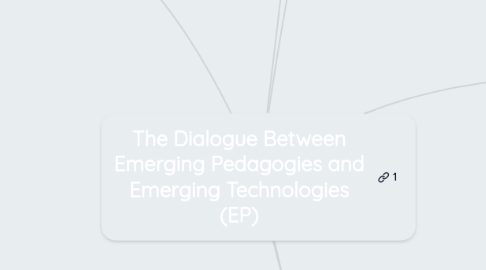
1. Proposal of the final project
1.1. The use of Instagram to improve the vocabulary of students of the basic English level.
2. Confetti Team
2.1. Emily Kahuil Lara
2.2. José Aberto Moo Chulim
2.3. Alejandra Isabel Perez Canul
3. Theories focused on network connections
3.1. Networked Learning
3.1.1. Learning in which ICT is used to promote connections.
3.1.1.1. BETWEEN
3.1.1.1.1. One learner and other learners
3.1.1.1.2. Learners and tutors
3.1.1.1.3. A learning community and its learning resources
3.1.2. Connectivism aligns well with networked learning theory.
3.1.3. It encompasses theoretical assumptions about learning and how to design for learning.
3.1.4. A network comprises connections between entities (nodes)
3.1.4.1. CAN BE
3.1.4.1.1. Individuals
3.1.4.1.2. Groups
3.1.4.1.3. Systems
3.1.4.1.4. Fields
3.1.4.1.5. Ideas
3.1.4.1.6. Resources or communities
3.1.5. Can be perceived as structures
3.1.5.1. External
3.1.5.1.1. Create to stay current, acquire experience, create, and connect new knowledge.
3.1.5.2. Internal
3.1.5.2.1. Exist within our minds in connecting and creating patterns of understanding.
3.2. Actor-Network Theory (ANT)
3.2.1. Proposes a socio-technical account
3.2.2. Explores the constructions of heterogeneous networks.
3.2.2.1. Human
3.2.2.2. Non-human
3.2.3. Is based on the principle of generalized symmetry.
3.2.4. Complex knowledge systems
3.2.4.1. There is no chance to trace social connections.
3.2.4.2. It is no possible to follow the actors or their actions.
4. Theorical Foundations of Emerging Pedagogies
4.1. View of pedagogy
4.1.1. The act of teaching and the body of knowledge.
4.1.2. A general vision of culture and society
4.1.3. A general term for educational studies, including fields like history of education, philosophy of education, etc.
4.1.4. Encompass multiple pedagogical components including content knowledge.
4.1.5. The whole context of instruction and the actual operations involved therein.
4.2. Professional competencies
4.2.1. Emergent pedagogy becomes a dynamic phenomenon that provides new scenarios for learning.
4.3. The Network Learning Theories
4.3.1. Theories focused on the network.
4.3.1.1. • Networked Learning • Connectivism • ANT
4.3.2. Theories focused on social-personal interaction.
4.3.2.1. • Heutagogy • Peeragogy
4.3.3. Theories focused on the design of the network.
4.3.3.1. • LAAN theory
5. The potencial of ICT depends on the skills used to design learning activities
5.1. that align
5.1.1. Technology
5.1.1.1. It is not something external; it is the context in which learning takes place.
5.1.1.2. The internet and digital media are the main infraestructura of the knowledge society
5.1.2. Pedagogy
5.1.2.1. Learning is located in the connections and interactions between learners, teacher and resources.
5.1.2.2. Pedagogy needs to make its practices visible and to design practices that take into account that a fundamental shift is needed.
5.1.2.2.1. toward
6. Learning Theories
6.1. Behaviorism
6.2. Constructivism
6.3. Cognitivism
6.4. Connectivism
6.4.1. Theory of our project
7. The Future of Learning
7.1. Future educational trends taking into account TECHNOLOGICAL issues as well as EDUCATIONAL changes.
7.2. Studies like: Horizon Project.
7.2.1. Description of Six Emerging Technologies over Three Periods of Time
7.3. Analyzing the evolution of the impact of emerging technologies
7.3.1. Patterns among the technologies, grouped in five trends.
7.3.1.1. Mobile technologies
7.3.1.1.1. Aspect such as a permanent connection and the availability of multiple applications designed to support learning.
7.3.1.2. Learning Analytics
7.3.1.2.1. Tools and techniques for collecting, analysing and displaying data.
7.3.1.3. Games and Gamification
7.3.1.3.1. Game - based learning.
7.3.1.4. Hybridization
7.3.1.4.1. Several Technologies that have the inter - connection and integration of the physical and digital worlds.
7.3.1.5. Natural Interaction with devices
7.3.1.5.1. Systems to interact with devices through facial expressions, gestures or voice recognition.
8. Characteritics of Emerging pedagogies
8.1. Educational values
8.1.1. Emerging pedagogies support lifelong learning
8.1.1.1. EP provide practices to support lifelong learning. The curriculum must enable individuals to learn to work effectively within social networks for educational, social and civic purposes,
8.2. Curriculum, pedagogy, assessment
8.2.1. EP use different forms of knowledge
8.2.1.1. EP are ‘knowledge pull’, which is based on providing learners with access to a plethora of tacit/explicit knowledge
8.2.2. EP integrate the use of technology as mindtools
8.2.2.1. EP encourage the ‘high-level’ use of technology, utilizing it as a ‘mindtool’ for creativity, collaboration and multimedia productivity.
8.2.3. EP change the traditional role of teachers and learners
8.2.3.1. EP are based on the foundation of teachers’ pedagogical capacity their strategies, ability to form partnerships with students in mastering the process of learning.
8.3. Personal and social process
8.3.1. EP integrate self- regulation, co-regulation and social regulation
8.3.1.1. The metaphor of the Personal Learning Environment (PLE) is useful for characterizing the need to integrate three types of processes: self-regulation, co-regulation and social share regulation
8.3.2. EP support ecologies of learning
8.3.2.1. Learning is multidirectional and multi-modal and learning is understood as part of living in different socio-cultural contexts
8.3.3. EP promote deep learning tasks
8.3.3.1. Deep learning tasks re-structure learning activities to the explicit development of students’ capacities to create and implement their learning
8.4. Educators, policies frameworks and research
8.4.1. EP are transparent
8.4.1.1. Pedagogical reasoning must be as transparent as possible and shared between students, teachers and others involved in students’ learning.
8.4.2. EP are based on social-constructivist pedagogies
8.4.2.1. EP need to explore and re-examine existing pedagogies by looking into their contribution in the contexts of the networked knowledge society.
8.4.3. EP demands new forms of assessment
8.4.3.1. EP emphasize the active engagement of students in their own learning, their responsibility, metacognitive skills and a dialogical
